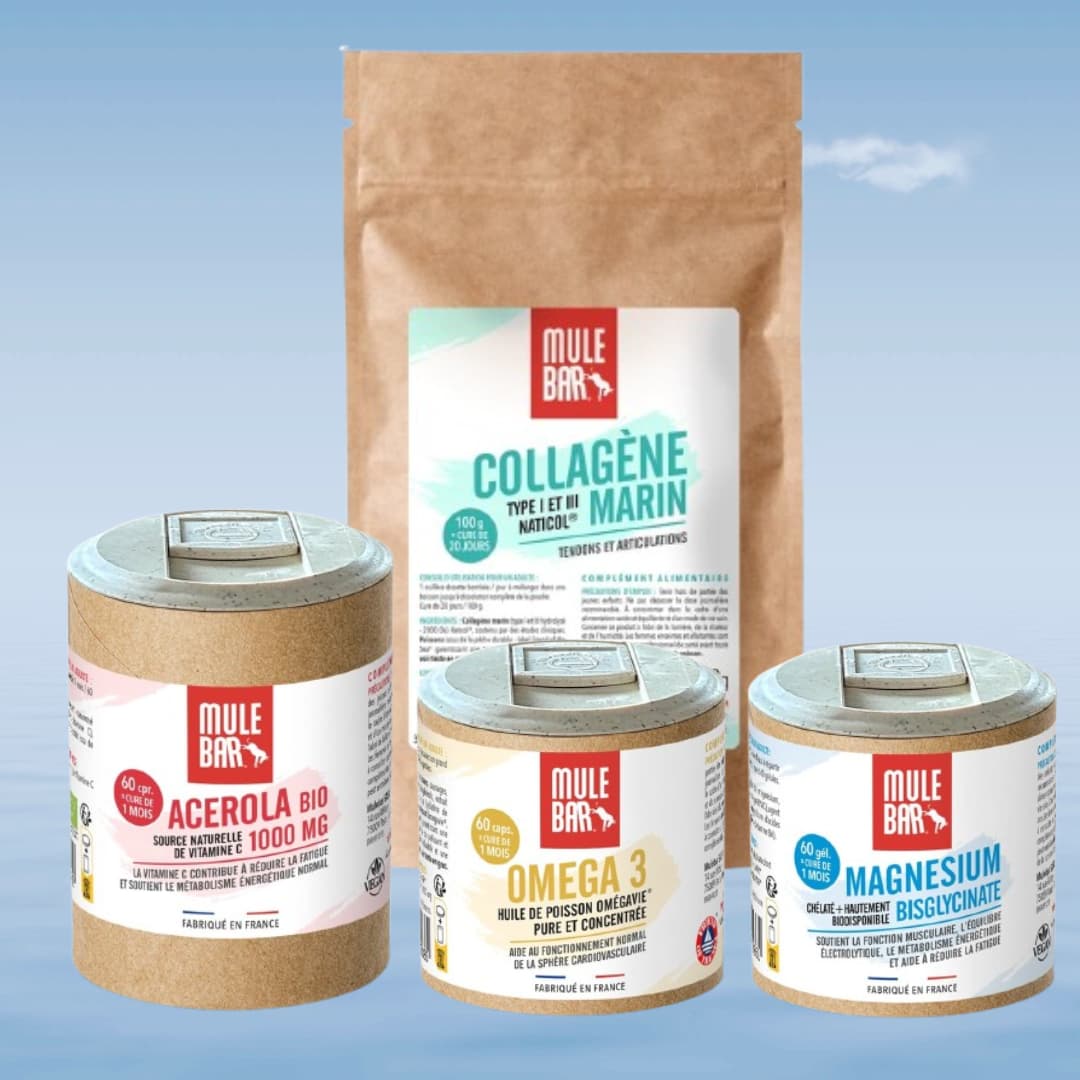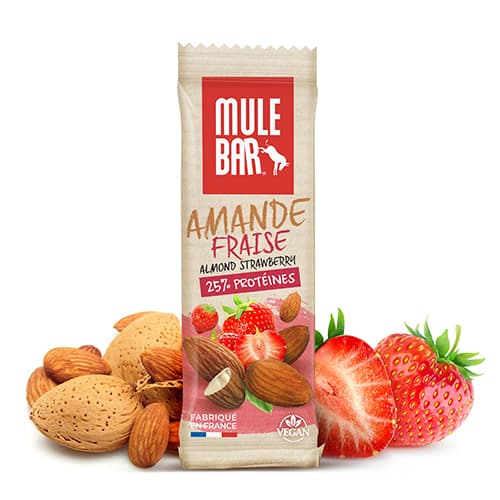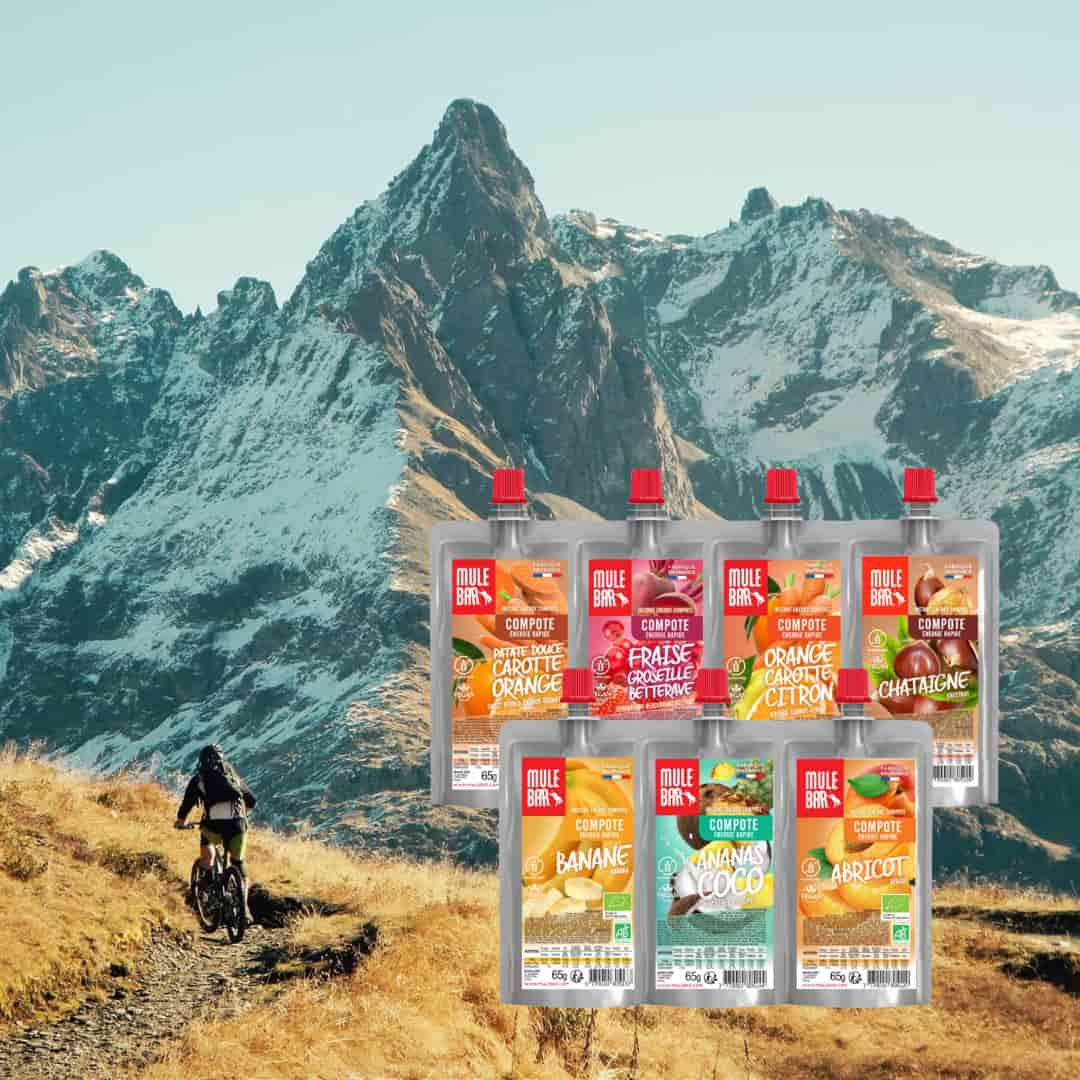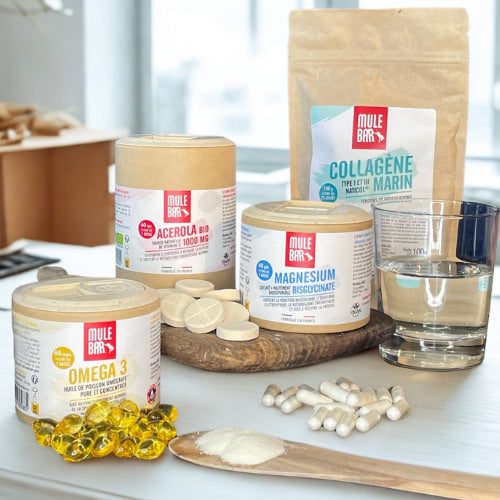Starting a trail run without proper nutrition preparation is like going hiking without a map; you risk running out of energy quickly. Proper nutrition for long trail runs boosts your endurance, prevents energy slumps, and allows you to finish your race in top form. Here's how to manage your trail nutrition before, during, and after the trail run to optimize your performance.
Eating well for trail running
Trail nutrition is built around three principles: replenishing your reserves in advance, maintaining good hydration, and adapting your diet to the intensity of the effort. Before the race, your muscles must store enough glycogen to last the duration. This nutritional preparation directly influences your sensations during the race and your ability to recover.

How to eat before a trail?
The days leading up to a trail run are crucial for refueling. Three days before the start, gradually increase your intake of complex carbohydrates—brown rice, pasta, sweet potatoes—to maximize your glycogen stores. This tailored nutrition plan forms the foundation for your performance.
- Ideal breakfast on D-day : A bowl of oatmeal with a banana, honey, and a few nuts provides a gradual energy boost. Eat this meal 2 to 3 hours before departure.
- Drink enough : drink 50cl of water with a pinch of salt when you wake up to compensate for nighttime dehydration.
- No innovations : Race day is not the time to test new products. Stick to foods you know well.
- Sugar dosage : aim for 8 to 10g of carbohydrates per kilo of body weight during the 48 hours preceding the race.
Your nutritional preparation shouldn't be limited to sugars. Incorporate lean proteins and colorful vegetables to reduce inflammation and strengthen your muscles before your trail run. This balanced diet will promote better recovery.
Carbohydrates during a trail
During exercise, your body consumes between 50 and 120g of carbohydrates per hour, depending on your pace. Spread this carbohydrate intake every 20 to 30 minutes with mineral-rich isotonic hydration to maintain good energy levels and avoid energy crashes.
- Anticipate : don't start eating when you feel tired, but from the first few kilometers.
- Vary the pleasures : alternate energy gels , bars and compotes so you don't get bored.
- Test in training : experiment with your adapted diet over several long rides to fine-tune the quantities.
Energy gels provide readily available sugars, ideal before steep climbs. Energy bars, which are more substantial, are perfect for rolling sections. Compotes, which are easy to digest, are invaluable when the pace is brisk.
Each format corresponds to a specific situation related to the terrain or your physical condition. During a trail, fatigue changes your desires: choose flavors that you like to continue eating well even after hours of effort. Discover natural solutions for your trail nutrition.
Effective recovery after a trail
The first 30 to 60 minutes after arrival are the ideal time to recover properly; this is the metabolic window. Combine 20g of protein with 1g of carbohydrates per kilo of body weight: a protein shake with a banana or a recovery drink rich in amino acids accelerates muscle rebuilding and replenishes your glycogen stores.
In the evening, eat a balanced meal with lean protein (fish, eggs), whole grains, and a variety of vegetables. These antioxidant-rich foods help your body eliminate waste products produced during exercise. Also, remember to stay well hydrated with water and mineral-rich drinks for 24 to 48 hours after the race for optimal recovery.
Eating smart while trail running
Energy compotes offer a delicious alternative to traditional snacks. Their soft texture is easy to swallow, even when your stomach is feeling tired after hours of running. Their natural formula helps stabilize blood sugar levels, providing consistent energy without sudden fluctuations.

Compotes and purees during a trail
A 65g portion of compote in a soft bottle is ideally consumed over an hour, taking small sips every fifteen minutes. This gradual method helps maintain a good level of carbohydrates in the blood, preserves the digestive system and provides a welcome energy boost before a climb or a technical passage.
Preparing your own recipes allows you to personalize flavors and optimize nutritional intake. For example, a savory puree made with sweet potato, soy milk, turmeric, and spirulina provides approximately 195 kcal and 22.6g of complex carbohydrates per 200g, a great option to vary the ubiquitous sweet taste during a trail run.
- Savory Sweet Potato Mash : Blend 1kg of cooked sweet potatoes, 500ml of plant-based milk, 200ml of soy cream with turmeric, ginger, spirulina, and salt. Add water to achieve the desired texture.
- Sweet Chestnut Recipe : Combining 150g chestnuts, 50g sweet potato, 100g unsweetened applesauce, 50g oat cream and 80g honey (320 kcal, 65g carbohydrates).
- Nutritional Enrichments : Spirulina provides iron and B vitamins, oat cream contains blood sugar-regulating beta-glucans, while colorful vegetables provide antioxidants like beta-carotene.
During your ultra trail, alternate these energy compotes with gels, an energy bar and a very low-sugar hydration drink rich in electrolytes to cover all your energy, hydration and sodium needs.
Alternating between compotes, gels and bars
Establish a nutritional rhythm in 60-minute cycles: compote at the 45th minute, gel during a rise at 1:30, energy bar on a flattening at 2:15 before returning to compote. This rotation maintains the taste interest and provides 50 to 90g of carbohydrates per hour, accompanied by 150 to 250ml of electrolyte drink to optimize hydration and digestion.
- Carbohydrate calculation : A 65g pouch of apricot compote provides 35g in total. Adjust your portions accordingly.
- Weather adaptation : In hot weather, favor liquid textures and increase electrolytes.
- Strategic times : Eat before climbs where digestion is more difficult, and moderate your intake on descents.
- Monotony Management : Introduce a salty flavor every 3 hours to break the routine and compensate for sodium losses.
Remember to rinse your mouth with a sip of water after each sweet treat. This aids digestion, protects your teeth, and makes the next treat more enjoyable.
Hydrating and eating while trail running
When running a trail for more than two hours, drinking water alone is no longer enough. Sweating causes a significant loss of minerals (sodium, potassium, magnesium) and unbalances electrolytes. To avoid cramps and fatigue, choosing the right isotonic drink becomes essential.

Hypotonic, Isotonic or Hypertonic
There are three types of sports drinks:
- Hypotonic drink : Perfect for short efforts (<1 hour), it hydrates quickly with few carbohydrates.
- Isotonic drink : Ideal for endurance, it provides water and electrolytes and carbohydrates in balanced proportions.
- Hypertonic drink : Reserved for recovery after exercise, as it is rich in sugars and slowly assimilated.
Quantify your losses and adjust sodium
To fuel your body well during a trail:
- Weigh yourself before/after training: 1 kg lost = 1 liter of water to compensate
- Drink 150-250ml every 15-30 min to maintain hydration
- Those who sweat a lot should aim for 300-600mg of sodium/hour
Tip: Take small, frequent sips rather than large quantities for better absorption. In hot weather, increase your intake of mineral salts (electrolytes).
Find out how to choose the best hydration drink for your needs.
Fueling for 25 to 100km races
Distance and elevation directly determine your energy needs and your nutrition strategy. A 25km hilly race requires less preparation than a 100km ultra trail with 6,000m of elevation gain. By adapting your nutrition plan to each distance, you'll avoid both unnecessary overload and calorie deficiencies.
25 km, 50 km and 100 km nutrition plans
For a 50km trail run , aim for 50-80g of carbohydrates per hour and drink 400-700ml of water or an isotonic drink, depending on the temperature. Alternate between savory compotes, energy gels, and small sips every 20-30 minutes to provide a constant supply to your muscles. If you're sweating a lot, consume 300-600mg of sodium per hour to maintain electrolyte balance and prevent cramps at the end of the race.
- Trail 25-35km : 30 to 60g of carbohydrates/hour and 300-500ml of water. Alternate between energy gels and energy bar pieces. Test this protocol during training to adapt the flavors and digestive tolerance.
- 50km Trail : Increase to 50-80g of carbohydrates/hour. Take advantage of aid stations for solid foods and rinse your mouth after each gel to limit acidity.
- Ultra 80-100km : Favor liquid textures (60-90g of carbohydrates/hour). Vary the flavors to avoid boredom.
Start eating within the first 45 minutes, without waiting until you feel tired. Take half a gel before a difficult climb to benefit from the blood sugar spike at the critical moment. This strategy often makes the difference between a controlled finish and a final collapse.
Organization of refreshment points in ultra trail
Plan your refreshment stops based on the route and your needs. Two 500ml flasks will last about 3 hours—replenish them at aid stations with your isotonic drink powder if only water is available. This organization is crucial for 100km trail nutrition, ensuring a consistent supply without overloading.
Keep compotes and Energy gels in accessible pockets so you can eat without interrupting your run. On technical sections, wait for a flat spot to consume an energy bar. After a trail run, start your recovery with 20g of protein and carbohydrates within 30-60 minutes of the race, even if you don't have an appetite.
Choose natural and effective products
100% natural compotes with brown rice syrup limit digestive problems. Without additives, they remain digestible during prolonged efforts, with rapid absorption (5 minutes) ideal before a difficult passage.
Mulebar drinks meet European standards for electrolytes and vitamins. Their range offers formulas tested by athletes. Compare the compositions with Maurten, Ta, Naak, and others using our nutrition guide to choose a high-performance and natural trail nutrition product. Consult the comparison guide to choose the right trail drink.
Frequently Asked Questions
How to manage your hydration during an ultra trail lasting more than 12 hours?
For a For optimal hydration during your ultra trail, alternate between electrolyte-enriched water and an isotonic drink containing carbohydrates. Drink small amounts (150-250ml) every 15 to 30 minutes. A good guide: weigh yourself before and after exercise. Each kilogram lost represents approximately 1 liter of fluid to replace. At night, maintain this rhythm despite the drop in temperature, and ensure an intake of 300 to 600 mg of sodium per hour to prevent cramps.
Should we favor industrial products or homemade preparations for trail running?
Both approaches have their advantages. Homemade foods (savory compotes, purees) allow for personalized combinations at a lower cost. Quality industrial products offer a stable composition, long shelf life, and convenient packaging. Our advice: try homemade preparations during training, and use professional solutions during races for their practicality and contribution to good hydration.
What foods should you eat in the 48 hours following an ultra trail to speed up recovery?
Recovery begins upon arrival: within the hour, consume 20g of protein and 1g of carbohydrates/kg via an isotonic drink or fruit. In the following days, focus on balanced meals with:
- Lean protein to rebuild muscle
- Whole grain carbohydrates (quinoa, sweet potato) to replenish glycogen stores
- Colorful vegetables rich in antioxidants
Remember to hydrate with water and electrolytes, and allow yourself periods of restorative sleep.






Leave a comment
This site is protected by hCaptcha and the hCaptcha Privacy Policy and Terms of Service apply.